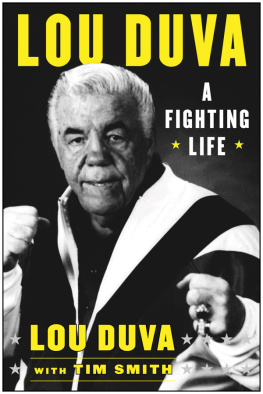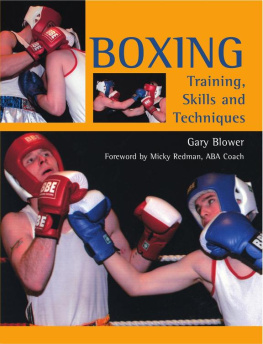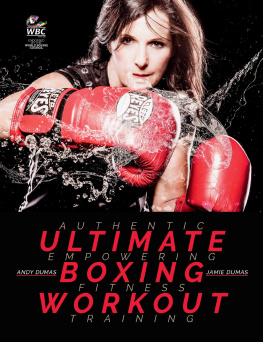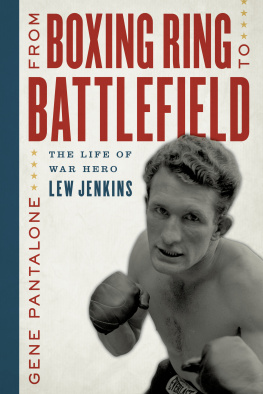Copyright 2016 by Lou Duva with Tim Smith
Foreword copyright 2016 by Evander Holyfield
All rights reserved. No part of this book may be reproduced in any manner without the express written consent of the publisher, except in the case of brief excerpts in critical reviews or articles. All inquiries should be addressed to Sports Publishing, 307 West 36th Street, 11th Floor, New York, NY 10018.
Sports Publishing books may be purchased in bulk at special discounts for sales promotion, corporate gifts, fund-raising, or educational purposes. Special editions can also be created to specifications. For details, contact the Special Sales Department, Sports Publishing, 307 West 36th Street, 11th Floor, New York, NY 10018 or .
Sports Publishing is a registered trademark of Skyhorse Publishing, Inc., a Delaware corporation.
Visit our website at www.sportspubbooks.com.
10 9 8 7 6 5 4 3 2 1
Library of Congress Cataloging-in-Publication Data is available on file.
Cover design by Tom Lou
Cover photo credit: AP Images
Print ISBN: 978-1-61321-821-1
Ebook ISBN: 978-1-61321-876-1
Printed in the United States of America
Lou Duva:
Id like to dedicate this book to the memory of my late wife, Enes, and my son, Dan.
My wife Enes passed away much too soon. She was my partner, the love of my life, and my biggest cheerleader (even when she told me I was nuts). She stuck with me through the lean timesI wish she could have been there through more of the good times. I always missed having you alongside of me!
And to my late son, Dan, who helped pave the way for myself and the kids into the highest level in boxing with his business smarts and legal background. Im grateful that, regardless of how many disagreements we had, you knew my strengths and weaknesses and supported me so I could do what I did best in boxing. You are dearly missed.
Tim Smith:
Id like to dedicate this book to my wife and life partner, Durmeriss, whose support has been invaluable throughout all my endeavors.
CONTENTS
FOREWORD
BY EVANDER HOLYFIELD
When I was getting ready to go to the Olympics, no one thought I would get past Ricky Womack. In fact, no one had even expected me to make the Olympic team in 1984. And when I did make it, no one really expected me to do much once the Games started. I wasnt one of those amateur guys that was a star. Maybe it was because I wasnt associated with some of the big-time trainers at the time.
I remember seeing these guys who had gone to the Kronk Gym, and they were going to Las Vegas to fight in tournaments. But I wasnt one of them. No one paid me any attention. I was just some guy from Atlanta to them. I really didnt know anything about going pro until I saw trainer Emanuel Steward start to bring guys like Tommy Hearns and Milton McCrory around the amateur team.

The first time I saw Lou Duva was at the Colorado Sports Festival. He was really popular. I had seen him on TV; he was this fiery guy with white hair. He was there working with Pernell Whitaker, Mark Breland, Meldrick Taylor, and Tyrell Biggs, the heavyweight. They were comparing Biggs to Muhammad Ali at the time. Pernell Whitaker was a good boxer, too. He had the sho-nuff stuff. Compared to those guys there, I was a peon.
Before the Olympics, I only had one sponsor: Ken Sanders. He owned a car dealership that I worked at in Atlanta. There was also a woman named Mrs. Josephine Abercrombie, who was interested in being my manager. She owned something called the Houston Boxing Association. They were the only ones who showed any interest in me as a boxer. Because I didnt know anything about business and Ken was a businessman, I decided to go with him as my manager.
I didnt have any notoriety going into the Olympics. Once there, my first three fights were knockouts. After I stopped those guys, everything started to shift. The controversy of me not winning the gold medal made me very popular. They even took me on the gold medal tour.
I got to know Lou during the Olympics. He was funny, but was always trying to help you. He was a good motivator, working to get the best out of you.
At that time I didnt understand the business of boxing. I was going to go with Mrs. Abercrombie or Emanuel Steward out of the Kronk Gym. Ken Sanders said if youre going for the money, then Mrs. Abercrombie is going to give you $800,000. If you going to be a champion, then go with Duva he trains champions. He thought I was going to say Abercrombie. I said I wanted to be a champion. He asked if I was sure this was the way I wanted to go.
Let me explain it to you, he said. People do things for money. Youre a poor kid. People go to college to make money.
Ken wanted to make sure that I knew what the deal was. My goal was never to make a lot of money. I said my goal was to be the heavyweight champion of the world. He said youre a light heavyweight. I said Im going to grow.
The only thing I ever wanted to be when I was growing up was heavyweight champion of the world. Lou Duva believed in that dream. He gave me $250,000 to sign, and promised me $1.2 million over the first two years. So I signed with his company, Main Events.
I started out at 175 pounds, but I couldnt make the weight after my first three pro fights. Lou thought it was because I was eating junk food. He tried to shame me by calling me a junk food junkie. I think he thought that would motivate me to lose the weight. But what he didnt understand was that I loved Burger King. I was finally making enough money so I could eat a Whopper when I wanted to eat a Whopper. It wasnt the junk food. I was walking around at 180 pounds, but I had 3 percent body fat. Once Lou knew that, he immediately understood.
Lou brought a lot of pizazz to the corner. But he knew that he needed help with the training and so brought in George Benton to work with us. George was a smart trainer. He knew a lot of boxing strategy and was a very good teacher.
The funny thing about Lou was he would always get so hyper in the corner that you thought he was going to have a heart attack during the fight. He would always have to make sure that he had his heart pills with him. It was scary sometimes, especially when he got all wound up and started to argue with the referee or the trainer in the other corner.
Lou would fight for youliterally. Ive seen him go after other fighters, trainers, referees basically anybody that was in his way when he got mad. It didnt make a difference how wrong you were. Lou would go in there and fight. He would come in the ring and grab peoples pants and pull them down, and he would always curse the referee out. He would clown people all night long if they said anything about his fighters.
I didnt realize how important Lou was to me in the corner until he wasnt there anymore. Sometimes you dont appreciate people until after theyve left. I thought I was doing all those great things on my own, but I didnt realize that Lou was complaining about everything and getting to the referee.
After the first Riddick Bowe fight, I realized that every referee bothered the dickens out of me. But I realized that it was Lou Duva who was fighting for me. Boxer John Ruiz would head butt me and the referee wouldnt help. Lou Duva wouldnt let that happen. He would have my back and curse out the referee immediately.
Everybody thought I was going to get knocked out when I fought Dwight Muhammad Qawi [in 1986 for the WBA World Cruiserweight Title]. I remember that Lou said to Qawi, Out with the old and in with the new. Evanders going to beat you. I was like, Why did you say that? Why did you make him mad? And Qawi said exactly what I thought. He said, Youre not going to be in the ring, but your fighter is. It scared the daylights out of me.











